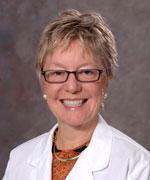Neonatal surgery, teaching and research: an interview with Diana L Farmer

In this interview, Dr Diana Farmer, University California Davis (CA, USA) internationally renowned fetal and neonatal surgeon, stem cell researcher and chair of the Department of Surgery at UC Davis Health System discusses her career to date and experiences as a woman working in STEM.
Inspired by International Women’s Day 2016, we are interviewing Diana L Farmer, UC Davis Health System’s Chair of the Department of Surgery (CA, USA), on her career to date and experiences as a woman working in science.

Dr Diana Farmer is an internationally renowned fetal and neonatal surgeon and chair of the Department of Surgery at University California Davis (CA, USA). She is known for her skilled surgical treatment of congenital anomalies and for her expertise in cancer, airway and intestinal surgeries in newborns and her leadership in Global Surgery. In 2010, Farmer was inducted as a fellow into the Royal College of Surgeons of England, becoming only the second American woman surgeon to receive this prestigious honor. In 2011, she was elected to membership in the Institute of Medicine of the National Academies, one of the highest honors in medicine. Farmer is included in the 2010 edition of Who’s Who Among American Women and has appeared on national television to discuss surgical innovations. Farmer has been principal investigator of several NIH clinical trials on the effectiveness and safety of treatments before birth for spina bifida and other birth defects, and she is researching a novel stem cell therapy for repairing damaged neural tissue in spina bifida patients. Farmer consistently has been recognized for her teaching and service by UC San Francisco including the 2008 Family House Volunteer of the Year Award, 2009 Golden-Headed Cane Award (the highest faculty teaching award), 2001 and 2002 Outstanding Women Faculty Chancellor’s Recognition Award, 2002 and 2008 Department of Surgery Excellence in Teaching Award, 2011 Holly Smith Award for Exceptional Service and recently by UC Davis for her mentorship. Currently, she is the Vice Chair of the American College of Surgeons Board of Governors and President-elect of the American Pediatric Surgical Association. She is also leading the Global Initiative in Childrens Surgery to address issues of access for children to surgical care worldwide.
How did you initially become interested working in fetal and neonatal surgery?
I was absolutely fascinated with embryology and the developmental anatomy of birth defects.
You are also a principal investigator at UC Davis Health System working on spina bifida— how did you become involved in stem cell research?
While I was in my surgical training in the 80’s I worked in a cancer immunology laboratory where we were part of the early trials of immunotherapy for cancer using Lymphokine Activated Killer cells. Little did I know at the time that this “cellular therapy” was an early form of what would become stem cell therapy. It’s amazing to think of harnessing the bodies own resources for advances healing. I think it’s much more interesting than giving drugs and other foreign agents.
Could you tell us a little about your current role?
Currently, I am Chairman of the department of Surgery responsible for teaching, research and clinical care in pediatric, cardiac, vascular, thoracic, oncologist and general surgery.
What does your typical working day involve?
Each day has tremendous variety and one has to be able to switch focus on a moment’s notice. I go from seeing patients to reviewing manuscripts or experiments to mentoring trainees and junior faculty to solving a crisis in staffing or stressing a meeting about health care financing. No day is ever boring!!
What accomplishments are you most proud of in your current role?
With regards to external metrics, I am most proud of having moved the department from below #50 in NIH rankings to #8 in less than 5 years. With respect to personal accomplishments I am proud to have recruited a fantastic and diverse group of young surgeons (including 50%new women) and given some young people an extra opportunity to believe in themselves.
What do you hope to have achieved in the next 5 years?
I want to make our department the most desirable department in the state for patients to get surgical care, for students to learn and for faculty and staff to want to work!
In general, do you think that women are underrepresented in science?
Yes, I think women are still underrepresented in science but that is changing slowly.
Have you ever in your career to date felt that you were at a disadvantage owing to your gender?
I never really felt that I was at a disadvantage because of my gender. Sometimes I think I was too stubborn and focused to notice unconscious bias.
You have significant experience of working both in medicine and in research. Did ever you notice any difference in opportunities available to women?
I have sometimes encountered bullying or unfairness but I think those people do that regardless of gender.
Did you notice any differences as you gained more senior positions during your career?
Some people are a bit uncomfortable taking direction or orders from women, but that too is changing.
Are there any female colleagues you particularly look up to or are inspired by?
I had the honor of meeting Golda Meir when I was in college. I always looked up to women who achieved the highest levels in their fields, be it Madeline Albright and Hillary Clinton in politics or Patricia Donahoe in Pediatric surgery.
Achieving a work—life balance can be a challenge for anyone, but women in particular can encounter challenges around pregnancy and promotion, returning following maternity leave, etc. Have you had any particular issues yourself, and how do you achieve the balance overall?
I have never been a good role model for balance.Mostly because I love my work and my work is my hobby. Late in life I have taken up Triathlon and the intense athletic training helps keep me balanced.
What advice would you give to female students and young researchers considering a career in STEM?
I advise all young people to follow their passion and be persistent. Don’t let gender, race, religion or any other perceived difference limit ones curiosity or ambition. Life is a precious and short adventure -one should make the most of it and follow her dreams!